Republicans demand action from Biden over Turkey’s $500k bounty on Enes Kanter Freedom
Turkish President Recep Tayyip Erdogan was forced to suspend his election campaign events on Wednesday after abruptly falling ill during a live television interview.
Erdogan tweeted after the appearance, “Today I will rest at home upon the advice of my doctors… with God’s permission, we will continue our campaign from tomorrow onwards.”
His sudden illness forced him to cancel a live appearance for the opening ceremony of a Russian-owned nuclear power plant in southern Turkey and comes amid a high-stakes Turkish election that is expected to come down to the wire.

An election triumph by a former civil servant dubbed the “Turkish Gandhi” on May 14 over Turkey’s strongman leader Erdogan – who has controlled the levers of power for 20 years in the strategically important country that straddles the Mideast and Europe – would have far-reaching implications for U.S. foreign policy interests.
Elections polls show a razor-close race between Erdogan and his social democratic Republican People’s Party competitor Kemal Kilicdaroglu, who recently declared that he is a member of the persecuted Alevi Muslim minority community within a country dominated by Sunni Islam.
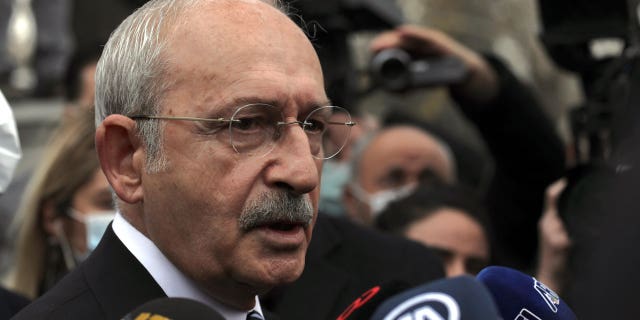
Turkish opposition leaders have nominated Kemal Kilicdaroglu to challenge President Recep Tayyip Erdogan.
The 74-year-old Kilicdaroglu, who heads an opposition group of six parties, had recently been slightly ahead of Erdogan in recent polling. However, two polls last week showed Erdogan ahead.
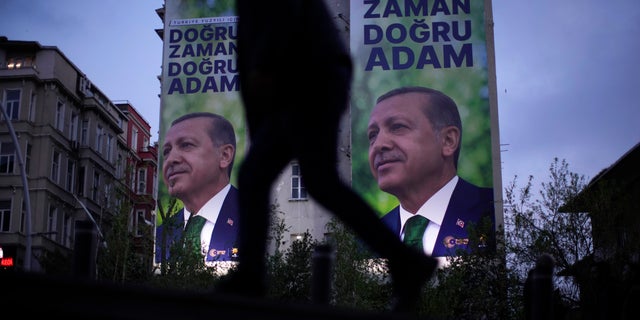
Billboards display Turkish President Recep Tayyip Erdogan, in Istanbul, Wednesday, April 19, 2023, and proclaim, “For the Turkish century, the right time, the right man.” Presidential elections in Turkey are scheduled to take place on May 14.
Michael Rubin, a Middle East expert for the American Enterprise Institute, who has written extensively about Erdogan, said if Kilicdaroglu dislodges Erdogan, “It would absolutely be a good thing” for the security interests of the U.S. and American allies.
Rubin said, “The sooner Erdogan is gone, the quicker Turkey can recover. The danger is that so many diplomats and security officials believe simplistically that the problem in Turkey is just Erdogan rather than a much broader ideology and twisted historical narrative. The United States must base its policy on Turkey’s behavior, not wishful thinking or the assurances of retired American diplomats who have a personal financial interest in Turkish businesses and close ties.”
The 69-year-old Erdogan has picked major fights with the U.S. over the decades, ranging from barring American troops from utilizing Turkish soil as an entry point to invade Iraq in 2003 to launching Turkish military strikes on the U.S.-allied Kurdish forces who helped America oust the Islamic State.
Turkey claims that the Kurdish forces in Syria are linked to the Turkey and U.S.-designated terrorist organization Kurdistan Workers’ Party (PKK).
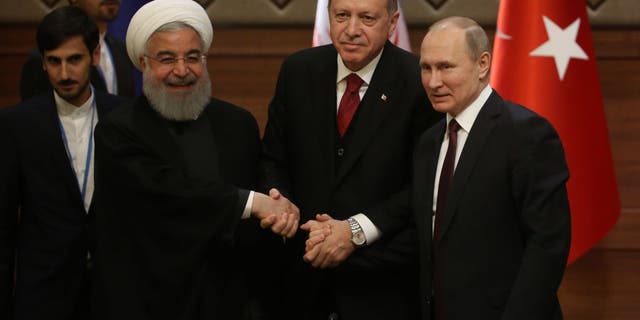
Russian President Vladimir Putin, Turkish President Recep Tayyip Erdogan and Iranian President Hassan Rouhani meet on April 4, 2018, in Ankara.
In 2020, the U.S. imposed sanctions on Turkey for its purchases of Russian S-400 air defense systems. Turkey is a member of the U.S.-led North American Treaty Alliance (NATO) that was designed to blunt Russian expansionism and military power.
Erdogan has caused political headaches for the U.S. by initially blocking Finland and Sweden from joining NATO. Finland recently gained admission and Sweden is waiting on its bid to be approved.
Uzay Bulut, a Turkish analyst and research fellow for the Philos Project, sees an uphill battle to repair American-Turkish relations. Erdogan’s attacks on U.S. foreign policy have generated intense anti-Americanism in the nation of just over 85 million people.
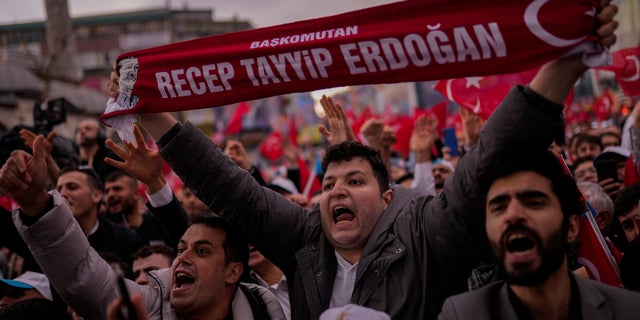
Supporters of Turkish President Recep Tayyip Erdogan listen to his speech during a campaign rally in Istanbul, Friday, April 21, 2023.
Bulut told Fox News Digital, “More than 94% of the people who spoke to the Areda Survey in 2021, for instance, said they do not believe that the U.S. is a friend to Turkey. According to various polls, the United States leads the list of most hated countries among Turks.”

She added, “Expecting the opposition to implement a pro-U.S., pro-NATO or pro-EU foreign policy would not be very realistic. Just like Erdogan, they will do whatever they believe their national interests require them to do. And this includes supporting China or other authoritarian regimes”
Questions abound about a new Turkish policy to the Syrian dictatorship of President Bashar Assad and whether Erodgan’s autocratic-style of leadership will permit a free and fair election.
Bulut said, “There has been no major objection to Turkey’s military presence in Syria from the opposition alliance. The only party who seriously objects to Turkey’s criminal actions in Syria is the Kurdish political opposition in Turkey.”
She added, “I don’t think a free and fair election is really possible in Turkey. Erdogan seems capable of doing anything to stay in power, including stealing the elections or causing violence in society in the event of his defeat in elections.”
Rubin echoed Bulut’s view about a Kilicdaroglu government withdrawing Turkish troops from Syria, stating, “Wishful thinking about Turkey is a chronic disease among American diplomats, and epidemic among Turkish expatriate journalists.”
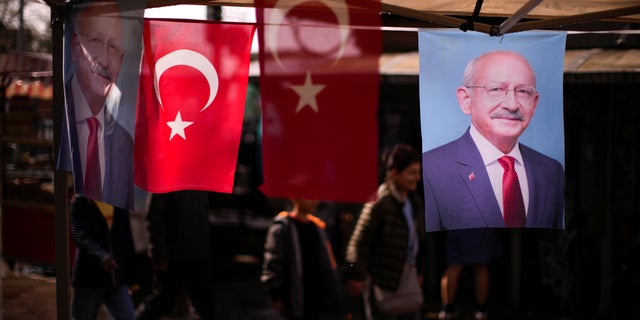
People walk past banners with the photograph of presidential candidate Kemal Kilicdaroglu in Istanbul, Turkey, Tuesday, April 18, 2023.
Rubin said, “Erdogan is no democrat. Period. He will cheat. He will manipulate. He will deny. He will calculate that the European Union will eventually give in, whether because many countries fear a wave of refugees pouring across the Turkish frontier or because Germany knows Erdogan can activate terror cells among the Turkish diaspora in that country. As for the United States, Biden’s record at holding firm suggests a serious need for diplomatic Viagra his advisers are not willing to prescribe.”
In an April, 18 column in the pro-Erdogan newspaper The Daily Sabah, Burhanettin Duran, a professor at Social Sciences University of Ankara, tackled the “Difference Between Erdogan and Kilicdaroglu.” Duran wrote that “Under Erdogan’s leadership, Türkiye has been among the most active countries in this new global and regional chapter.”
Duran, who is a member of the Turkish Presidency Security and Foreign Policies Council, continued, “By contrast, Kilicdaroglu remains unimpressive, mainly in foreign policy, national security and national defense. His party has not made any severe pledges except dialogue with Syria and launching a new regional organization in the Middle East.”
Fox News Digital reached out to the Turkish government about the election and its foreign policy.
The soft-spoken Kilicdaroglu secured a reputation for rooting out corruption during his time running the country’s Social Security Institution.
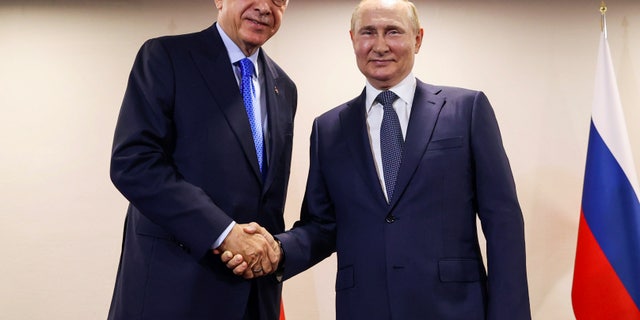
Turkish President Recep Tayyip Erdogan shakes hands with Russian President Vladimir Putin during their meeting in Tehran, Iran, July 19, 2022.
Kilicdaroglu’s striking resemblance to the Indian nationalist leader Mahatma Gandhi, along with his low-key demeanor, earned him the nickname “Turkish Gandhi” or “Gandhi Kermal.” When he was assaulted in the Turkish parliament in 2014 via punches to the face causing bruises, he told his fellow MPs to relax, declaring, “The path to democracy is full of obstacles.”
Erdogan’s handling of the horrific earthquakes in February that killed more than 50,000 Turkish residents has placed question marks over his role in construction safety in a region long vulnerable to earthquakes. The combination of alleged lax safety standards during Erdogan’s building boom and a reportedly defective relief effort after the earthquake are burning campaign topics.

Rubin, the Turkey expert who is a fierce critic of Erdogan, argues that “after 20 years of Erdoganism, the problem is no longer one man but the entire system. Erdogan has both reshaped the bureaucracy (in) his own image, and he has also demonstrated to the opposition what a potent tool unhinged Turkish nationalism can be. Erdogan has left an economy in tatters, one that won’t be easily fixed.”
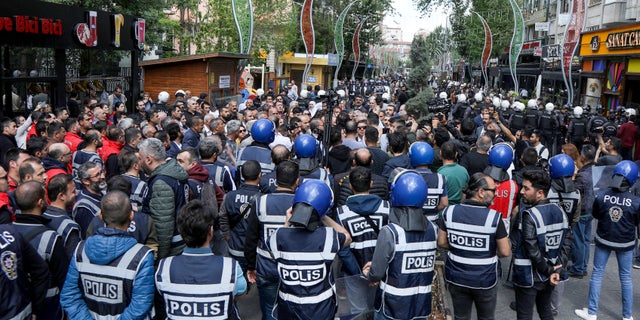
Protesters demonstrate against the detention of 110 people over alleged militant ties. The operation came less than three weeks before the biggest electoral challenge President Tayyip Erdogan has faced since he came to power in 2002.
Ragip Soylu, the Turkey bureau chief for Middle East Eye, who previously worked for the Daily Sabah, outlined why Erdogan remains a formidable candidate and his recent achievements in an April policy article for the Washington Institute for Near East Policy.
Soylu notes that Erdogan “has repaired damaged relations with Arab heavyweights over the past couple of years. One result was that, in 2021, the United Arab Emirates agreed to a $5 billion currency swap with Ankara and pledged to invest $10 billion in Turkey’s start-ups and high-tech industry.”
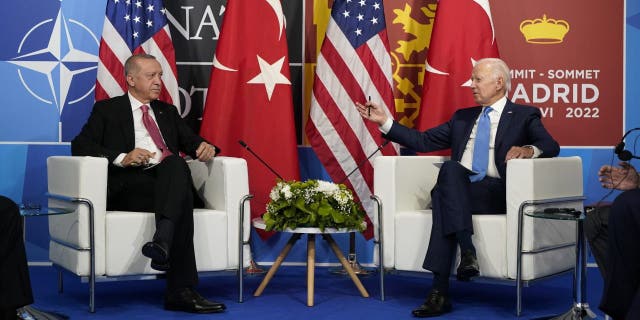
President Joe Biden meets with Turkey’s President Recep Tayyip Erdogan during the NATO summit in Madrid, June 29, 2022.
Erdogan is seeking to be somewhat more inclusive in a shift away from his brass-knuckle style of power politics. “Erdogan invited opposition representatives and his media critics to the event held to promote this concept, calling on them to acknowledge all his government has done in the service of Turkish society,” wrote Soylu.
The confluence of perhaps the most pivotal election in Turkey’s history, coupled with the100th anniversary of the founding of the Turkish Republic in 1923, has electrified commentators, Turks and observers of the Ankara’s complex politics. The stakes are high for the U.S., NATO, the volatile Middle East and Europe.
A spokesperson for the U.S. State Department told Fox News Digital, “Türkiye is a long-standing U.S. ally and partner. We will continue to work together with the government chosen by the Turkish people to deepen cooperation around shared priorities.”
Source: Fox News









